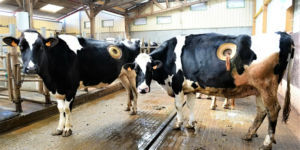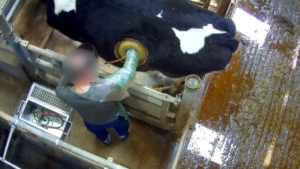When you hear the word “portholes,” you likely imagine small windows on a ship or airplane, but they’re also used in a very different context—on cows. Yes, you read that right. Farmers and scientists have been using portholes on cows to access their stomachs for decades. This controversial practice, while largely unknown to the general public, plays a key role in livestock research and agriculture. Here’s everything you need to know about the use of portholes on cows, their purpose, and why this practice is both praised and criticized.
What Is a Cow Porthole?

Cow portholes, also known as cannulas or fistulas, are surgically installed openings that provide direct access to a cow’s stomach. These openings are typically sealed with a plastic ring that keeps the hole accessible for research purposes. The procedure allows scientists to insert or remove material from the cow’s rumen (the largest of its four stomachs) without having to repeatedly sedate or operate on the animal.1
A Practice Dating Back to the 1920s

The practice of fistulating cows began as early as the 1920s. Originally, researchers wanted a better way to study a cow’s digestive process. By creating an opening in the cow’s side, researchers could take samples of partially digested food, microbes, and gases directly from the stomach. This method has since become a common practice in agricultural research, particularly for improving digestion and studying how cows process feed.
Why Are Portholes Used on Cows?
Portholes offer easy access to a cow’s stomach for research on digestion and feeding efficiency. Farmers and scientists use them to monitor how cows digest food, aiming to improve feed formulations that optimize growth, milk production, and even minimize harmful emissions like methane and nitrates.2 The ultimate goal is to create a more sustainable and productive agricultural system while reducing the environmental impact of livestock farming.
The Impact on the Cow’s Health
Surprisingly, researchers claim that cows fitted with portholes often live longer than their counterparts. After an initial recovery period of four to six weeks, the cows are said to live relatively normal lives. Studies suggest that these cows do not suffer long-term pain and can even live up to 12–15 years. However, the initial surgery does involve some discomfort and risk for the animals.
Maximizing Milk Production and Reducing Emissions
The primary reason behind this procedure is to maximize food production and reduce environmental harm. By understanding how cows digest different types of feed, researchers can help farmers develop diets that improve milk production and reduce the need for antibiotics. Furthermore, minimizing methane emissions from cows—one of the largest contributors to greenhouse gases in agriculture—has become a major focus of this research.
Criticism and Ethical Concerns
Despite the benefits to research, the use of portholes has drawn significant criticism, especially from animal rights groups. Some argue that the practice is invasive and cruel, describing it as an unnecessary exploitation of animals. In France, where the procedure has been used extensively, organizations like L214 have condemned it as an “unfair system” and have launched petitions to end the practice.
Are There Alternatives to Portholes?
As technology advances, alternative methods for studying digestion are being developed. For example, laboratory models that simulate the fermentation process in a cow’s stomach are becoming more popular. These plastic models mimic the conditions within the rumen, reducing the need for fistulated cows. However, many researchers still believe that direct access to a live animal offers insights that cannot yet be replicated in a lab setting.
Portholes on Display at Agricultural Events
In some countries, cows fitted with portholes are even showcased at agricultural fairs and events. Visitors are sometimes invited to reach into the cow’s stomach to see how its digestive system works firsthand. While these demonstrations aim to educate, they have sparked controversy and protests, with many calling it an unnecessary spectacle.
The Debate Over Animal Welfare
The debate surrounding portholes on cows raises larger ethical questions about the treatment of animals in agriculture. While proponents argue that this research helps improve animal health and sustainability, critics maintain that it prioritizes industrial gains over animal welfare. It’s clear that the practice will continue to be controversial, even as scientists search for less invasive methods.3
A Controversial but Useful Practice
The use of portholes on cows highlights the complex intersection of science, agriculture, and ethics. While this practice has contributed to advancements in livestock management, it remains a source of significant debate. As more people become aware of the procedure, the conversation around animal welfare and sustainable farming practices is likely to evolve further.





